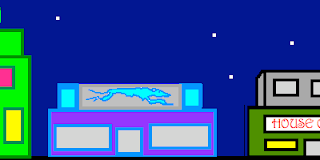
"complete dissatisfaction with everything I have done in writing... Unless writing has the danger and immediacy of bullfighting it is nowhere to my way of thinking... I am tired of sitting behind the lines with an imperfect recording device receiving inaccurate bulletins... I must reach the Front."
thus william s burroughs, a little over fifty years ago, around the time of the olympia press publication of naked lunch, quoted by alan ansen in his piece (more than once reprinted) "anybody who can pick up a frying pan owns death." cutups are not mentioned in the piece but the books immediately following naked lunch - minutes to go, the exterminator, and the 1961 soft machine, were the first flowering of cutups. and seem the effective result of this "complete dissatisfaction". burroughs was always quick to credit the "discovery " of the technique to brion gysin . and both admitted that it had been basically done before by tristan tzara.

the original literature of cutups is mostly concerned with describing the technique.
but the motivation for the technique is not consistently or clearly described. consistency, clear description, and a distinct motive might all be seen as defeating the purpose. usually it seems the purpose is to "cut through the word lines" and expose the falsity of conventional narrative and language. this tracks with the notions of "imperfect recording device" and "inaccurate bulletins". it also echoes the original intent of the dead serious, official surrealist movement of breton & co, whose verbal and visual juxtapositions ( of lobsters, umbrellas, sewing machines ...) were to send the hated bourgeoisie screaming for the exits of history.

but elsewhere - often in the same essay or manifesto - more modest goals are contemplated. like "something to do". or summon the spirits of dead writers and create "new" works by them.
"Take any poet or writer you fancy... Fill a page with excerpts. Now cut the page. You have a new poem...Shakespeare Rimbaud live in their words. Cut the word lines and you will hear their voices... Table tapping? Perhaps. Certainly an improvement on the usual deplorable performance of contacted poets through a medium..."
- the cut-up method of brion gysin, by burroughs, reprinted in "the third mind"

this is a very modest goal. it is not a new form of writing, it is a new form of reading.
but any cutup, even of completely "original" material, blurs the line between writing and reading. you "write" something with the cutup or other random method, and then read it to see "what happened". this is different from the usual method, where the writer begins with something to communicate and then reads it to see if it communicates as accurately as desired. the cutup abolishes or bypasses communication. or does it? not necessarily, if the words of only one writer are used. an individual writer like shakespeare or rimbaud can be considered a style, and the style can be formed not by logic or sequence but by the selection of images and phrases. is style communication? it can be defined as such. but most people would not.

cut up shakespeare or rimbaud and you might get shakespeare or rimbaud, but cut up samuel johnson or adam smith or richard burton and you don't get those writers. or do you? is any "writer" more than a set of words, a select vocabulary?
computers are acknowledged by many to be able to identify writers - basically by counting words.
is there really any such thing as a "writer" at all? or just individual brains, which continuously process - read/write - words - and can not do anything else?

the brain becomes bored, and seeks - reads/writes - new words. or does it? solace is found in the familiar words, the familiar patterns. maybe words can not be eliminated from the brain but they can be made so monotonous as to lose all meaning.
"i know people who claim to have read the same book a hundred times. i don't know what they are doing but they are not reading." - w somerset maugham
it is not cutups that "rub out the word" but familiar, formulaic writing. like prayers, like "genre" writing - romance, private eye, serial killer, vampire novels...
exercise: write something - not a word for word copy of something already known to be written - but so completely unoriginal - that it couldn't possibly be copyrighted or claimed as one's own. try it, it's not that easy (of course set aside all notions of "literary quality")
"complete dissatisfaction with everything i have done in writing..."

|











